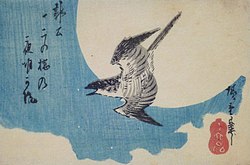ほととぎす
Jump to navigation
Jump to search
Japanese[edit]
Etymology 1[edit]
| Alternative spellings |
|---|
| 子規 時鳥 杜宇 杜鵑 田鵑 蜀魂 郭公 不如帰 |

From Old Japanese.
The final su is most likely す (su, “bird”, ancient term only found in old compounds), itself possibly cognate with Korean 새 (sae, “bird”).
Pronunciation[edit]
Noun[edit]
ほととぎす or ホトトギス • (hototogisu)
- the lesser cuckoo, Cuculus poliocephalus
- Synonyms: 卯月鳥 (uzukidori), 沓手鳥 (kutsutedori), 時つ鳥 (tokitsudori), 時の鳥 (toki no tori)
- Hypernym: 郭公 (kakkō)
- 1187, Senzai Wakashū (book 3, poem 161; also Hyakunin Isshu, poem 81)
Derived terms[edit]
Derived terms
Proverbs[edit]
- あの声で蜥蜴くらうかほととぎす (ano koe de tokage kurau ka hototogisu)
- 鶯の卵の中のほととぎす (uguisu no kaigo no naka no hototogisu)
- 子で子にならぬほととぎす (ko de ko ni naranu hototogisu)
Etymology 2[edit]
| For pronunciation and definitions of ほととぎす – see the following entry. | ||
| ||
| (This term, ほととぎす, is the hiragana spelling of the above term.) For a list of all kanji read as ほととぎす, see Category:Japanese kanji read as ほととぎす.) |
References[edit]
Old Japanese[edit]
Etymology[edit]
From ほととぎ (poto2to2gi1, onomatopoeic imitation of the bird's cry) + す (-su, suffix representing birds).
Noun[edit]
ほととぎす (poto2to2gi1su)
- the lesser cuckoo, Cuculus poliocephalus
- (poetic) allusion to 飛幡 (To1bata, a placename)
- , text here
- 霍公鳥飛幡之浦爾敷浪乃屢君乎將見因毛鴨
- poto2to2gi1su To1bata-no2-ura ni siku nami1 no2 sikusiku ki1mi1 wo mi1mu yo2si moga mo
- (please add an English translation of this usage example)
- , text here
Derived terms[edit]
- 醜ほととぎす (siko2-poto2to2gi1su, “ugly cuckoo”)
- 元ほととぎす (moto2-poto2to2gi1su, “cuckoo that came and sang last year”)
- 山ほととぎす (yama-poto2to2gi1su, “mountain cuckoo”)
Descendants[edit]
- Japanese: ほととぎす (hototogisu)
Categories:
- Japanese terms inherited from Old Japanese
- Japanese terms derived from Old Japanese
- Japanese terms with IPA pronunciation
- Japanese lemmas
- Japanese nouns
- Japanese hiragana
- Japanese terms with usage examples
- Old Japanese onomatopoeias
- Old Japanese terms suffixed with す
- Old Japanese lemmas
- Old Japanese nouns
- Old Japanese poetic terms
- Old Japanese terms with usage examples
- Old Japanese makurakotoba
